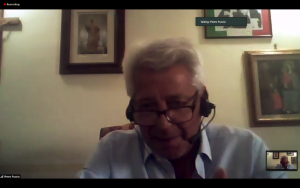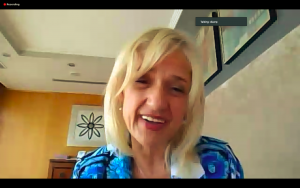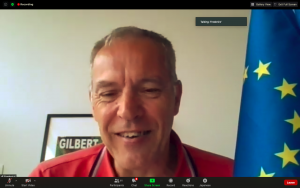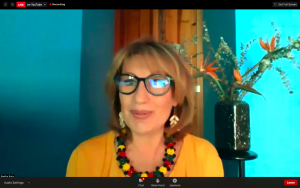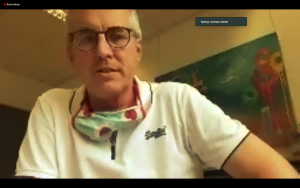
Colonia è una città che ha avuto svariati casi di covid-19 anche se ieri (2 giugno, ndr) si sono riscontrati solo 14 casi attivi. Abbiamo avuto il sistema sanitario monopolizzato che ha potuto aiutare i pazienti. C’è stata collaborazione con le città gemellate, come Lille, ed abbiamo aiutato la città di a Bergamo. Quindi c’è stata una bella cooperazione.
La risposta di Colonia alla pandemia è stata la cooperazione internazionale per poter lavorare insieme e aiutare le città; volevamo essere attori attivi e centrali. Ci sono tante conseguenze in più e questo non è vero solo per la pandemia, ma per tutto ciò che riguarda anche la tematica della migrazione. In Germania abbiamo le problematiche della pandemia, ma anche tutto ciò che riguarda le problematiche dei trasporti e l’esigenza di poter garantire i servizi pubblici. L’utilizzo della bicicletta da parte dei cittadini era al centro delle soluzioni e quindi abbiamo voluto utilizzare questa opportunità.
Per quanto riguarda la cooperazione, l’abbiamo sviluppata con le nostre città gemellate ma anche con altre città che abbiamo aiutato in questa fase di pandemia, come il Perù e la foresta amazzonica, aiutando gli ospedali lì in loco, dando una mano al sistema sanitario peruviano, aiutando le reti locali per organizzare l’aiuto all’Amazzonia con medicinali ma anche con il cibo basilare e, non solo.
L’Ambasciata tedesca ha implementato la cooperazione locale: la settimana passata, oltre all’aiuto gli ospedali abbiamo collaborato anche per il sistema educativo e accademico. Abbiamo promosso dei Seminari, webinars, con la stampa per informare i cittadini di ogni città su come si poteva organizzare una collaborazione, una campagna di aiuto in loco con le città sorelle. Ci sono state delle donazioni di cibo per le famiglie più vulnerabili, 10.000 euro donate a Barcellona, Liverpool proprio per poter avere indumenti di protezione.
Abbiamo avuto cittadini che hanno aiutato tantissimo le popolazioni locali. La cooperazione internazionale è stata davvero veramente molto impattante. In Germania abbiamo visto cosa succedeva in Cina, in Spagna e in Italia e abbiamo voluto reagire prima degli altri. Per noi la questione cruciale è stata quella di aiutare tutti perché abbiamo ricevuto in passato così tanto dalla cooperazione che ci siamo sentiti di restituirlo.
Cologne is a city that has had several cases of covid-19 although yesterday (June 2, ed.) there were only 14 active cases. We had the monopolized health care system that could help patients. There was collaboration with twin cities, like Lille, and we helped the city of Bergamo. So there was a good cooperation.
Cologne’s response to the pandemic was the international cooperation to work together and help the cities; we wanted to be active and central actors. There are many more consequences and this is not only true for the pandemic, but also for everything related to migration. In Germany, we have the problems of the pandemic, but also everything related to transport issues and the need to be able to guarantee public services. The use of bicycles by citizens was at the heart of the solutions, so we wanted to use this opportunity. As far as cooperation is concerned, we developed it with our twin cities but also with other cities that we helped in this pandemic phase, such as Peru and the Amazon forest, helping the hospitals there, helping the Peruvian health system, helping the local networks to organize aid to the Amazon with medicines but also with basic food and, not only.
The German Embassy has implemented the local cooperation: last week, in addition to helping the hospitals, we also collaborated for the educational and academic system. We promoted seminars, webinars, with the press to inform the citizens of each city on how to organize a collaboration, a campaign of help on the spot with the sister cities. There were donations of food for the most vulnerable families, 10,000 Euros donated to Barcelona, Liverpool just to be able to have protective clothing.
We had citizens who helped the local populations a lot. The international cooperation was really very impressive. In Germany we saw what was happening in China, Spain and Italy and we wanted to react before the others. For us, the crucial issue was to help everyone because we have received so much from cooperation in the past that we felt we had to give it back.

